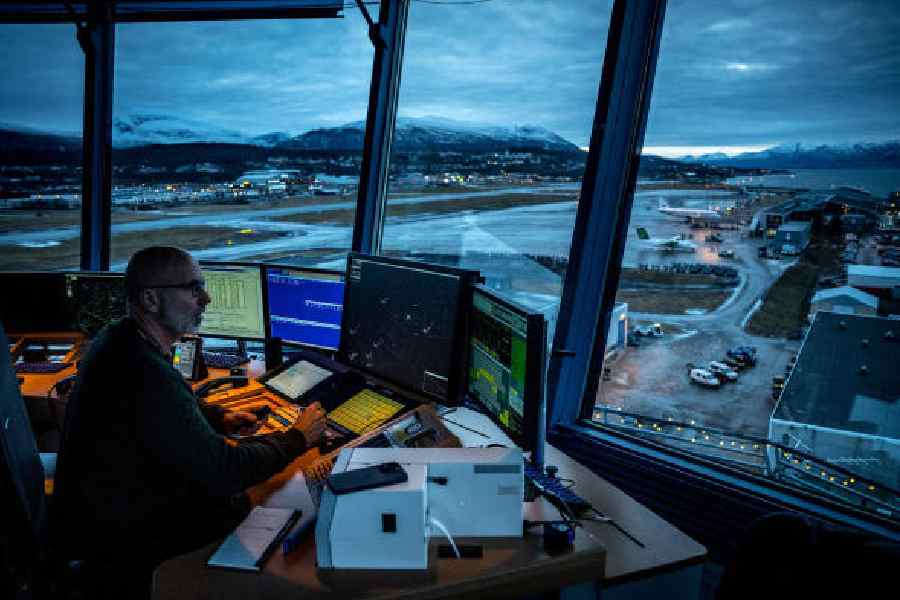Electronic warfare in West Asia and Ukraine is affecting air travel far from the battlefields. Planes are losing satellite signals, flights have been diverted and pilots have received false location reports or inaccurate warnings that they were flying close to terrain, according to European Union safety regulators. The US Federal Aviation Administration has also warned pilots about GPS jamming in West Asia.
Radio frequency interference — intended to disrupt the satellite signals used by rockets, drones and other weaponry — spiked after Russia’s invasion of Ukraine and has grown even more intense in West Asia. The interference can involve jamming satellite signals by drowning them out with noise, or spoofing them — mimicking real satellite signals to trick recipients with misleading information.
The radio interference has so far not proven to be dangerous. But aircraft systems have proved largely unable to detect GPS spoofing and correct for it, according to Opsgroup, an organisation that monitors changes and risks in the aviation industry. One Embraer jet bound for Dubai, UAE, nearly veered into Iranian airspace in September before the pilots figured out the plane was chasing a false signal.
“We only realised there was an issue because the autopilot started turning to the left and right, so it was obvious that something was wrong,” crew members reported.
Airplanes can typically fly safely without satellite signals, and large commercial aircraft have at least six alternative navigation systems, pilots said. Business jets such as Dassault Falcons, Gulfstreams and Bombardiers appear to be more susceptible to signal spoofing, the European Union Aviation Safety Agency said.
The strain on aviation could be a harbinger of far-reaching economic and security problems as the weapons of electronic warfare proliferate. Financial markets, telecom companies, power providers, broadcasters and other industries around the world rely on satellite signals to keep accurate time. One study from Britain said that a five-day disruption of satellite signals could cost the country $6.3 billion.
Satellite signals are known to be susceptible to jamming and spoofing. They transmit from orbit, over 12,000 miles above Earth, and are so weak their power compares to that of a lightbulb.
But many experts had dismissed spoofing attacks as too complicated and expensive for all but the highly-trained, according to Todd Humphreys, a professor of aerospace engineering at the University of Texas at Austin, US.
Russia has disrupted GPS signals to misdirect Ukrainian drones and throw precision-guided shells off their targets. Ukraine also jams Russian receivers but lacks the same level of sophistication.
Jamming is common in conflict zones. Spoofing, until recently, was rare. “I have never seen this level of spoofing,” said Martin Drake, a technical expert for the British Airline Pilots’ Association who retired after 42 years as a pilot.
The interference has been felt up to 190 miles away from battlefields and “appears to go well beyond simple military mission effectiveness”, according to Eurocontrol, Europe’s primary air traffic control manager. The worst-affected regions include the skies above the Black Sea area from Turkey to Azerbaijan; the Mediterranean Sea extending from Cyprus to Libya; the Baltic Sea near Poland and Latvia; and the Arctic near Finland and Norway.
Airbus said it recorded nearly 50,000 interference events on its aircraft last year, more than four times as many as the year before. This came on top of an over 20-fold jump in radio-interference events from 2017 to 2018, as recorded by a voluntary incident reporting system run by Eurocontrol. Eurocontrol said the increased jamming since 2018 was most likely meant to interfere with battlefield drones.
“The effects of this false signal are for the first time being seen in the last two months,” said Mark Zee, the founder of Opsgroup.
The spoofing attacks, he said, have exposed a fundamental flaw in aviation electronic design, which is based on the idea that GPS signals can be trusted, and need not be verified.
Opsgroup said that the latest events should prompt manufacturers to reexamine the integration of satellite signals in aircraft electronics, known as avionics, without a safeguard that can identify false signals.
NYTNS










